#vogue thailand
Text

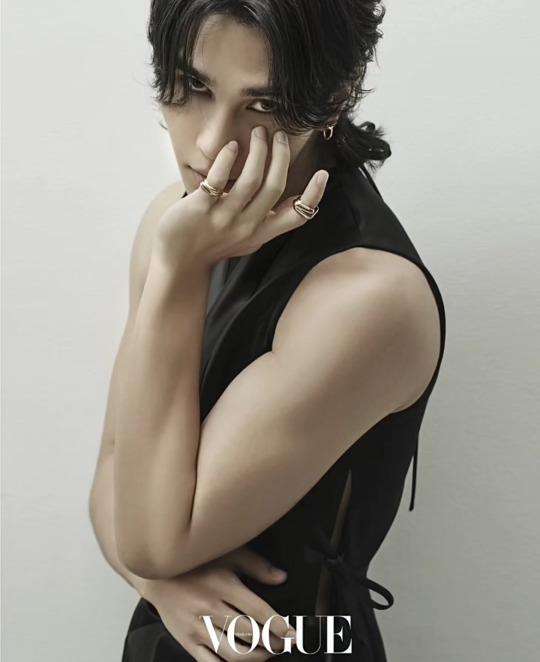

for vogue thailand
282 notes
·
View notes
Photo

Aweng Chuol for Vogue Thailand February 2022 Beauty Issue
1K notes
·
View notes
Text
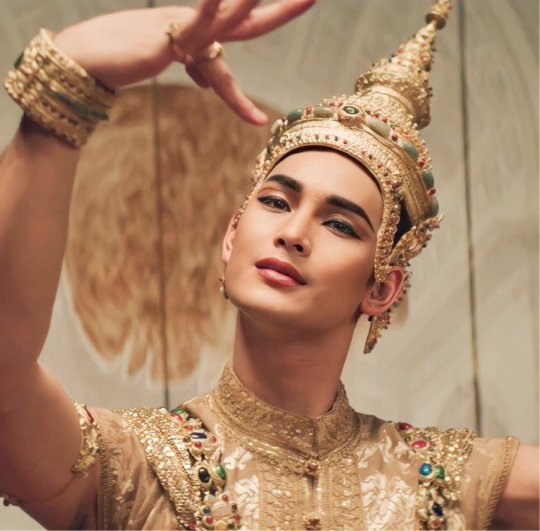

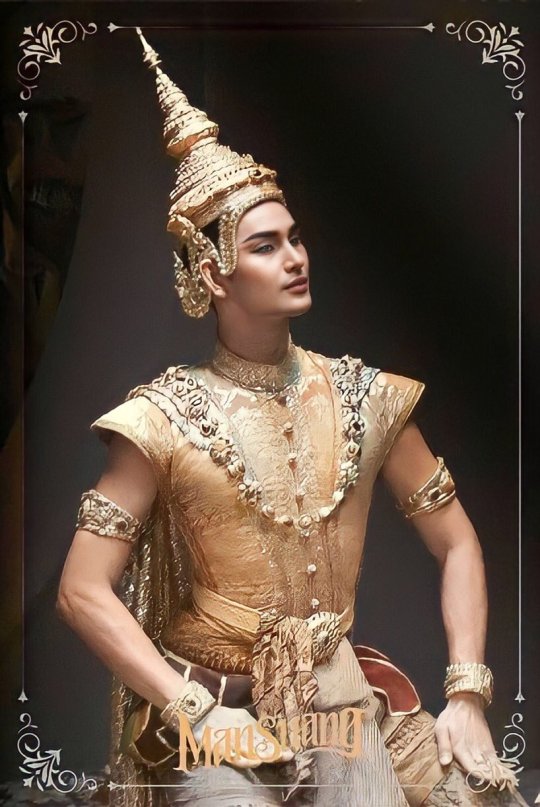
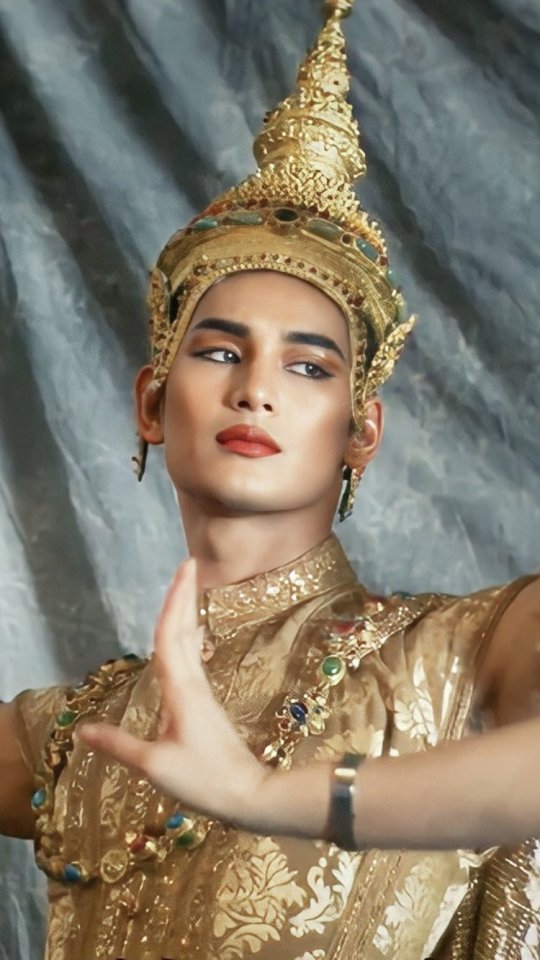
Beautiful Khem
I saw an interview somewhere that said this costume is to represent Phra Law which is a Lakhon Nok dance drama.
In the briefest possible summary - It is about Prince Phra Law who is so devastatingly handsome that it ends up causing a lot of trouble and tragedy which seems very apt!
#apo nattawin#man suang#khem#phra law#lakhon nok#thai dance#vogue thailand#thai dance drama#thai literature#thai film#historical#man suang costumes
280 notes
·
View notes
Text
Mile and Apo in their interview for the Vogue Gala.
Mile confirmed he is involved in creation of the soundtrack for both Shine and 4Minutes


Mile and Apo: replies to the questions at each other
Int: why am I here then

*OUR* personal space

#mileapo#kinnporsche#mile phakphum#apo nattawin#shine#4minutes#mileapo x vogue#vogue thailand gala#vogue thailand
96 notes
·
View notes
Text
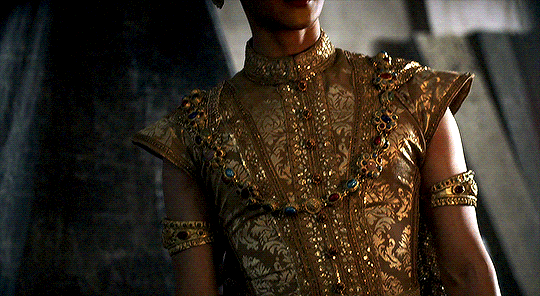
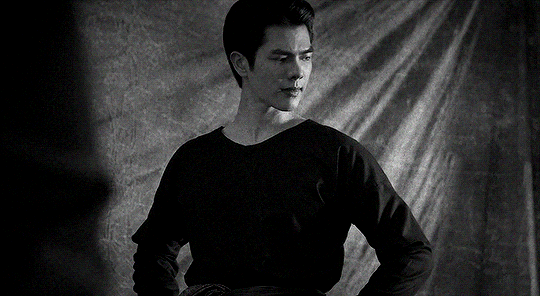

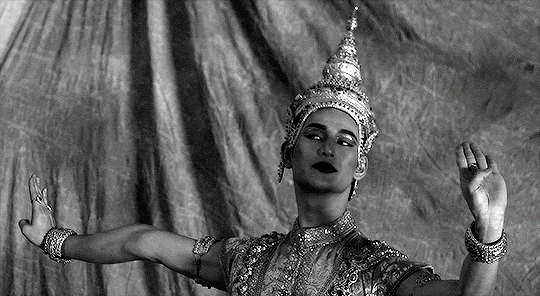

Mile Phakphum & Apo Nattawin for Vogue Thailand
#mileapo#mile phakphum#apo nattawin#man suang#vogue thailand#vogue#gifs*#**#they're so beautiful#'chatra & khem for vogue thailand'#usermileapodaily
275 notes
·
View notes
Text

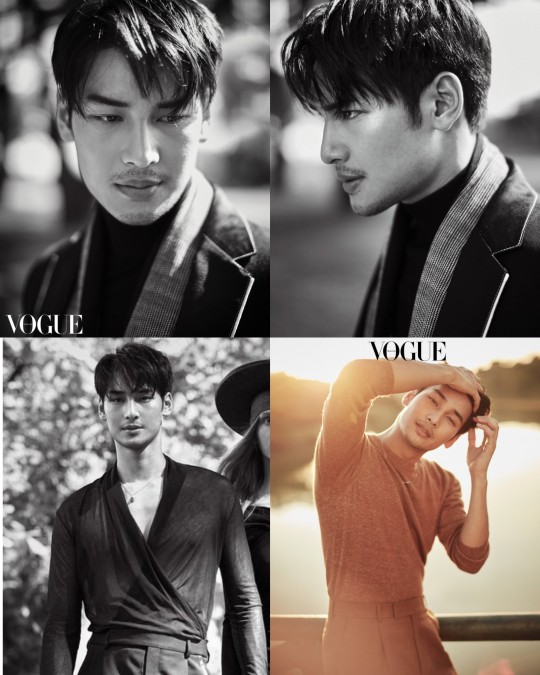
A bunch of Apo drawings based on the Vogue Photoshoot! 🥰
#Kinnporsche#Kinnporsche the series#Apo Nattawin#mileapo#Mile Phakphum#Fanart#Artists on tumblr#Digital art#thai drama#Vogue Thailand#My art#@silverquill
533 notes
·
View notes
Text



APO NATTAWIN | VOGUE THAILAND (for @rainbowcolours07)
#translation credit in source#apo nattawin#kinnporsche#kinnporsche cast#vogue thailand#gif#ofc it wont even @ the blog 🙃
615 notes
·
View notes
Text
They came, they ate, they slayed and left nothing behind.



Bonus from Instagram and Book wearing his beret!

cr. @waymaycl on Instagram
62 notes
·
View notes
Text



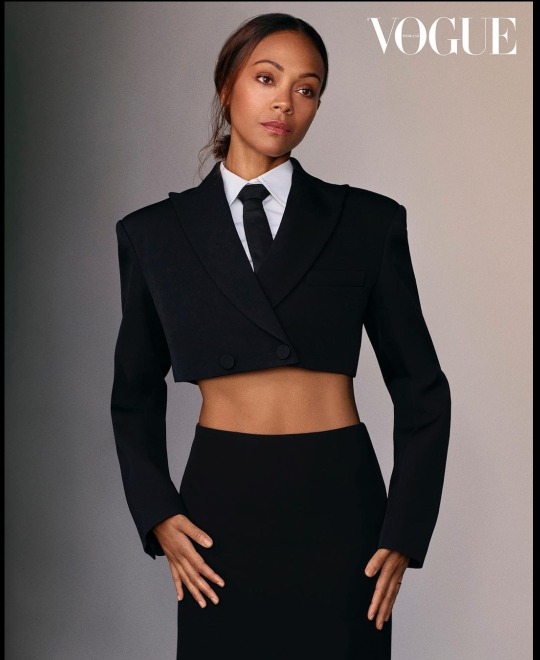
Back with another pick your fav;)
55 notes
·
View notes
Text
Apo Attending the #VOGUEGALA2024 looking Absolutely Stunning in Dior and Piaget.
APO AT VOGUE GALA #NattawinVogueGala2024 #VOGUEGALA2024 #ApoNattawin #Piaget #dior
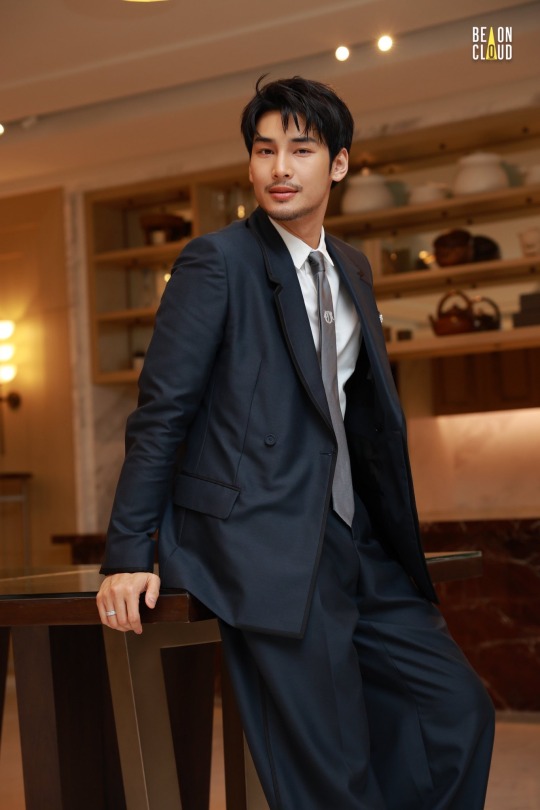
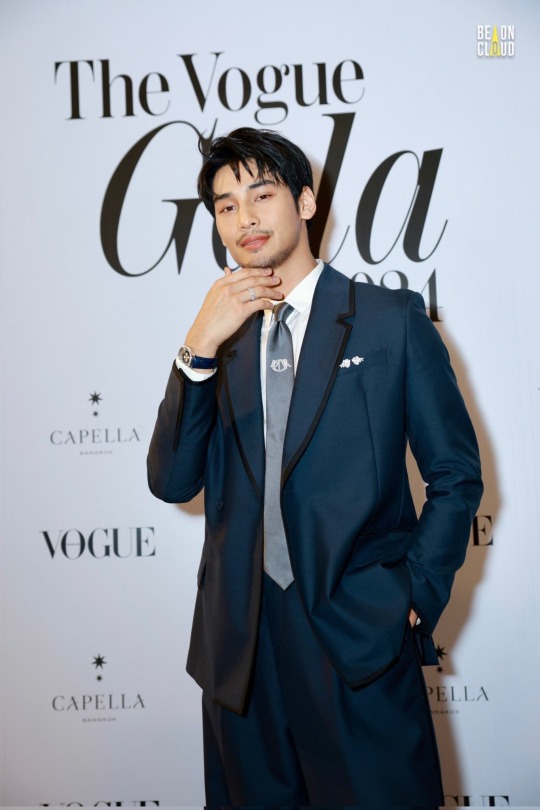

#nnattawin#apocolleagues#apo nattawin#handsome#beautiful eyes#am drooling#stunning#apo555#dior#VOGUEGALA2024#vogue thailand#diorsummer24#christian dior
21 notes
·
View notes
Text

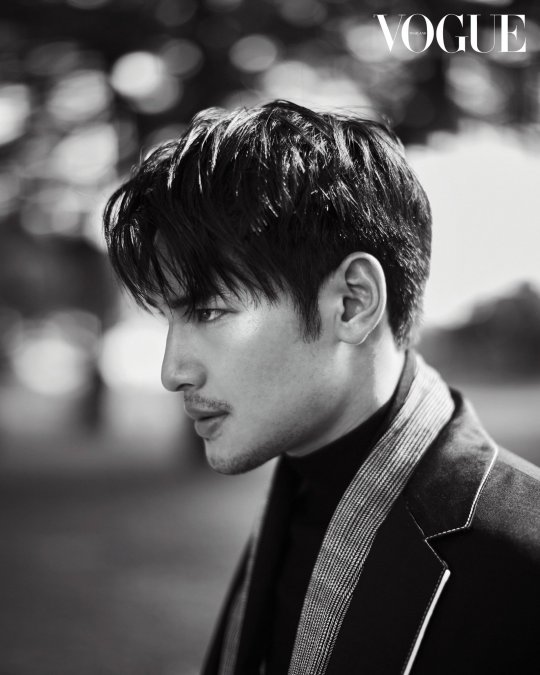
Apo for Vogue Thailand - Vogue Thailand Twitter
161 notes
·
View notes
Text
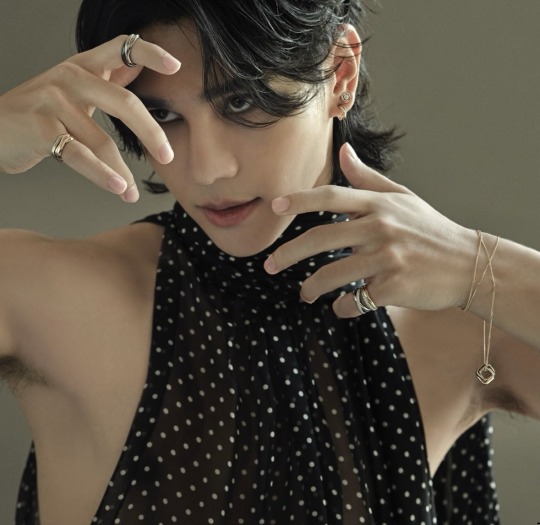


for vogue thailand | 02 2024
+

278 notes
·
View notes
Text


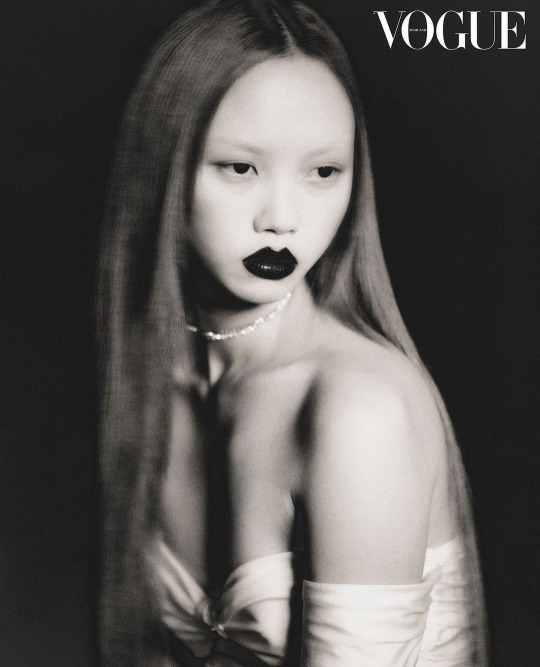

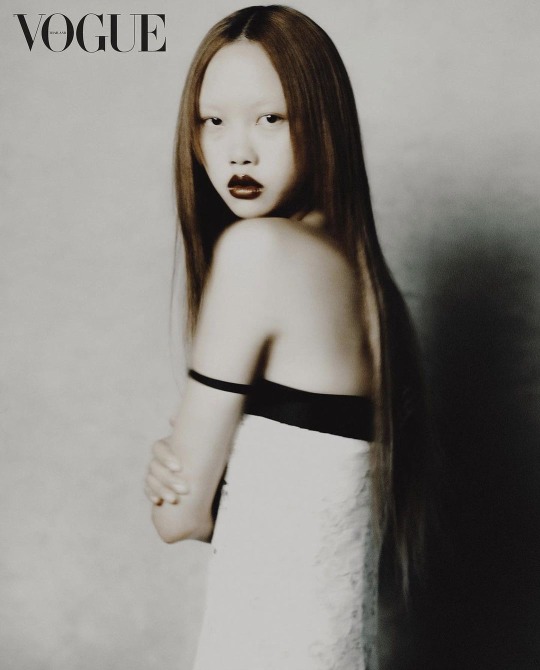

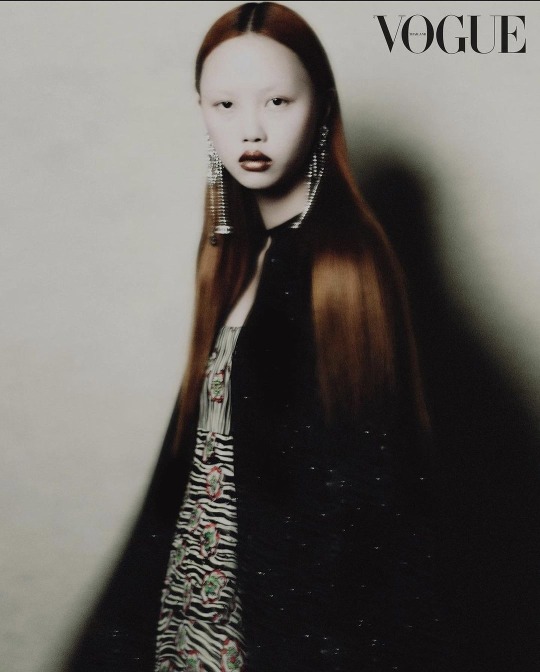
Jan Baiboon by Luka Booth for Vogue Thailand February 2023 issue
168 notes
·
View notes
Photo
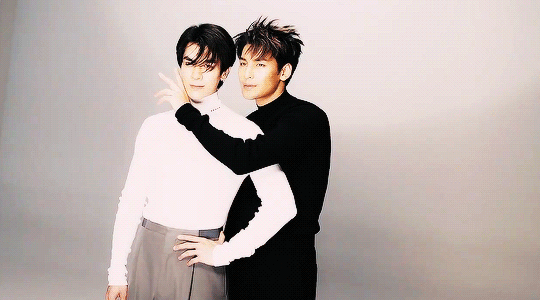


.😍.
#kinnporche the series#mileapo#mile phakphum romsaithong#Apo Nattawin Wattanagitiphat#apo nattawin#kinnporsche#kinn#porche#mile#apo#mygifs#so beautiful#vogue thailand#mileApo vogue
390 notes
·
View notes
Text
MileApo and the rise of Thai soft power
Mile and Apo talking about the Thai period film at the Vogue Thailand Gala on 2022/9/21
I've been meaning to sit down and write about this for a while now, ever since I saw the pattern of Mile and Apo injecting it into their talking points about the 2023 historical film, but it's taken some an effort to actually lay it out. Hopefully the time I sat with it will make the it a more insightful, rich reading experience.
Disclaimers:
(1) I have no formal experience in international relations aside from reading and watching the news, but my strong point is research. Folks with a more formal backgrounds in policsci or IR are welcome to add their input!
(2) Comments about policies or political actions of nations, whether positive, neutral or negative, are not meant to reflect on private individuals of the nationality, even those with a notable amount of social-cultural capital. Private individuals, despite their positions of social influence, most often have little to no individual influence on a policy level**.
So without further ado:
What is soft power? (aka soft power for dummies)
Joseph Nye, a then-Harvard professor, coined the term soft power in the 1980s/early 90s. He described it as:
“A country’s ability to influence the preferences and behaviors of various actors in the international arena (states, corporations, communities, publics etc.) through attraction or persuasion rather than coercion.”
In his book Bound to Lead, Nye established that three prongs of a country's soft power were its culture, its political values, and its policies. Here are two different graphics that further break down what those look like when evaluating soft power in practice.
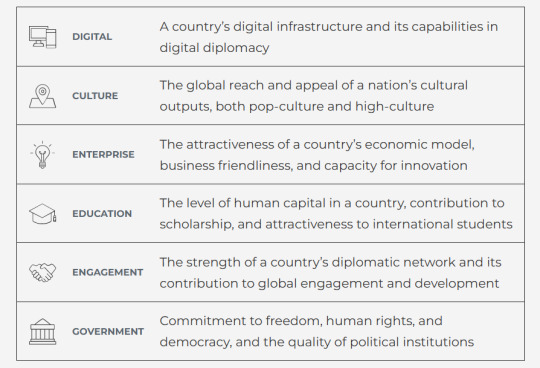
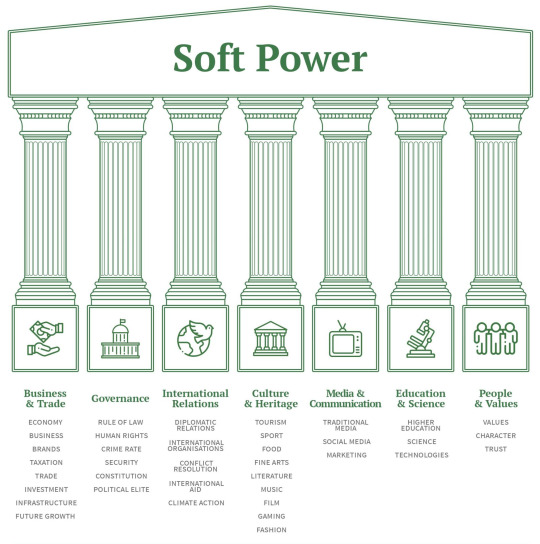
If you feel like all the above is still vague to the point of unparsable in an applied context, I spent the majority of the time researching how to demystify the term especially in the way MileApo discuss it, and found this great explainer:
A strong nation brand and positive soft power perceptions allow a nation to promote itself as a place for people to visit, invest in, and build a reputation for their quality of goods and services. [...] it is often overlooked that a strong nation brand and soft power can deliver better outcomes at home. Primarily it encourages domestic tourism, the consumption of domestic goods and services (rather than imports). Less tangibly it also just makes people feel better about their country.

Expressed in this context, soft power can be understood as the act of building trust in the cultural products of a nation domestically -- some more abstract in the form of art (music, film) and culture, some more concrete like products including fashion and beauty -- in a manner to appeal to its own citizens while also broadening the appeal of cultural goods abroad in a which can drive international tourism, trade, and commerce.
In other words: yes, our collective desire to actually taste Farmhouse bread.
The Thai government and the push for soft power
While my interest in this topic was originally piqued by MileApo's comments, soft power policy has to originate at the government level. Note again that Nye's definition of soft power is centered around "a country’s ability to influence", therefore soft power policy must always formally be expressed nationally.
Around the time MileApo consistently began promoting soft power in alignment with the period film, I noticed a slew of references in Bangkok Post, one of the reputable English online publications based in Thailand.
Back tracking through some of the articles as a reflection of national conversation, since 2020, there has been a consistent theme in terms of what the government is attempting and how well it's going (or not going):
On Thailand's soft power and positioning in the world, Feb 2020:
According to Kitti Prasirtsuk of Thammasat University, who has carried out extensive research into Thailand's branding and repositioning in the age of interconnectedness and social media, Thailand and its culture, values and foreign policy have charisma and high persuasive power which can attract admiration and cooperation. But the Thai people and bureaucrats must change their mindset and perceptions and appreciate their country in real terms first before they take up new challenges.
Within Asean, Thailand is behind Singapore as No.1 [among SE Asian soft power rankings]. The report stated that Thailand has the potential to rise into the top 30 in the world, if the country can strike the right political balance between the rural poor and urban elite. It went on to say that Thailand's weaknesses are problems related to corruption and inequality. It also said that the Thai government is failing to showcase the full potential of Thailand's rich cultural offerings beyond tourism. One more weak link is its poor performance in public diplomacy and digital infrastructure.
(Mile, Apo, and Bible all attended Thammasat University, which is considered one of the premiere universities in Thailand. Apo later transferred and graduated from a different university.)
On Milli, a Thai rapper who performed at Coachella in Spring 2022:
The presence of the 19-year-old rapper Milli at the Coachella Music Festival in the United States has reinvigorated Thailand's soft power ambitions -- an area the Thai government has not fully explored nor exploited. Milli, whose real name is Danupha Khanatheerakul, is the first solo Thai artist to perform at Coachella, a music festival that draws tens of thousands of fans annually.
[Milli's prescence at Coachella] was able to advance Thailand's soft power [in ways previously stalled]. It is not that the government is clueless about "soft power". For decades, governments have focused on presenting Thailand's soft power to the world. However, that iteration of "soft power" mainly consisted of Thai customs and traditions such as food, costume, classical dance, Buddhism rituals and the wai. These aspects of our cultural heritage, despite being charming to foreign tourists, are not sufficient to catapult Thailand's into a stronger position in the global market. Thai cultural heritage has failed to catch up in the digital age…
Milli's song also includes ideas relevant to international audiences. One of her songs openly discusses sexual consent. Being relevant is one of the keys to increasing the nation's presence among diverse populations. The cultural impact made by a young girl like Milli should make the government rethink its cultural promotion strategy. More support is needed for progressive Thai artists and innovators.
An opinion rebuttable on Milli's performance and the government's blundering of reaching for soft power while not meeting basic domestic requirements:
One of the minister's advisers belted out a long speech that did not seem to address how Thailand will become a "soft power" but used the term multiple times. One can't help but wonder if the ministry knows what it is doing, or what the so-called "soft power" it is espousing is about.
Milli's self-taunting line "I don't ride an elephant" may sound a bit old but her rapping about how "the country is good, people are good, our food is good but the government is bood," seems to have struck a chord. "Bood" means rotten in Thai. It is thus understandable if the government was not too coherent when discussing anything about the phenomenon that Milli created. Indeed, [Thailand's Prime Minister] Gen Prayut should feel awkward discussing the "soft power" of Milli and mango sticky rice when he filed a defamation charge against the teen rapper himself back in June last year.
Talented as Milli is, and extraordinary her achievements both locally and at one of the world's most famous music festivals have been, the teenage rapper really has nothing to do with so-called "soft power" which government figures are talking about. Her success is largely individual. Milli created a sensation and a craze. For Thailand's "soft power" to be built, let alone recognised globally, it takes more than one successful artist…
The whole product must be good if it is to exert influence. As experts argued, it takes a wide range of qualities for a country to say it has "soft power". These include the quality of its political institutions, education, digital development, innovation, cultural appeal, strength in arts or business brands. That is why it is odd for everyone to talk about Thailand's "soft power" now when we don't seem to have ticked any of the basic requirements.
On Bangkok International Fashion Week (BIFW):
BIFW2022 has been [a] major and continuing mission to promote and drive Thai fashion to international levels. The event strategically aligns with the government’s strategy to empower Thai fashion industry as fashion is one of the most influential soft power that stimulate economic growth.
Note that multiple actors in BOC walked BIFW2022 in September, as well as multiple actors from other Thai BL shows that aired in 2022.
On the increasing popularity of Thai BL:
Thai BL is now popular across Southeast and East Asia[, and] has been gaining traction in Japan, the home of BL, since 2020. Posters of famous khu jin were put up in a train station. Magazines that cover Thai drama, including BL, are rolled out for the Japanese audience. The Tourism Authority of Thailand has launched a Twitter account that uses BL to engage Japanese consumers. They are conducting research on these issues in the context of soft power.
Yes you read that correctly. No joke, BL as a facet of Thai soft power is so prevalent now that the government is literally tracking its popularity and Twitter conversation around the topic.
So what does this all mean?
Thailand is a country within Asia and internationally that has a lot of appeal as a tourism destination. However, with many competitor alternatives in both entertainment (particularly film and music) and beauty/fashion, which are major drivers soft power within Asia and internationally, and domestic dissidence of policy and politicians due to social conditions, Thai cultural power is not as prominent as it could be and also suffers at the international level.
While there is appeal of specific Thai cultural products internationally (such as Milli at Coachella or in the case of Kinnporsche the Series) the government has failed to activate these prominent media products as part of a cohesive soft power strategy.
However, the government does seem aware of the potential, specifically in the realm of BL. Thailand has always maintained an image of being LGBTQ-friendly among all the Asian countries, and may now be looking to push LGBTQ-aligned media (BL and GL dramas) specifically as part of its soft power strategy to increase pop culture and media appeal.
MileApo on Soft Power
Part of the reason my ears perked up at MileApo's consistent talking point of soft power is again, because even without a polisci background, I'm aware that soft power is expressed at the country policy level. Thus when both of them started specifically using the term to discuss the film in pre-production phase, it got my brain gears turning.
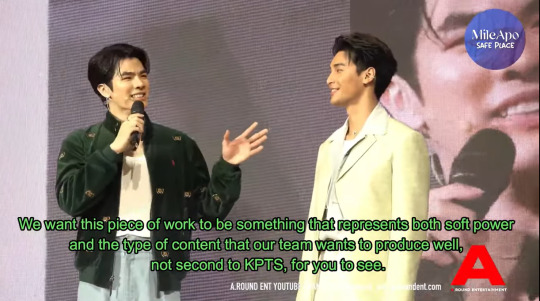
Mile talking about the film on 2022/9/24 at the D7 Grand Opening (vid/txt)

"Nong Po will act with Hia Mile -- please look forward to this movie next year, please look forward to that a lot. We want to expand Thai culture and soft power..." Apo on the Thai period movie at the KPWT Send off on 2022/9/11
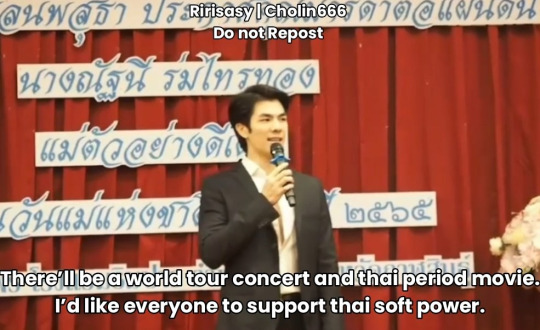
Mile Phakphum's speech on Mother's Day in Kalasin, 2022/8/5
Here's what we do know. Apo's dance training for the film is with a teacher affiliated with the academy that also produces dancers who specifically entertain the royal court.
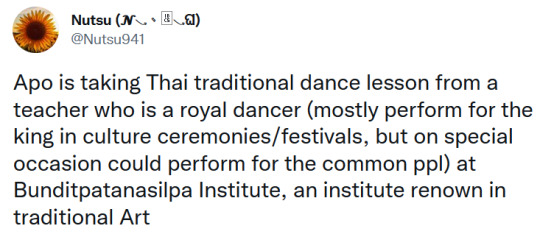
And here is what they individually said in the Vogue Thailand print interview (completed in late August 2022, published October 2022)
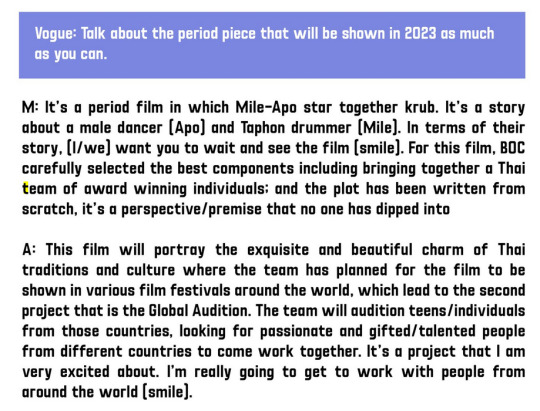
And I would be remiss and dishonest to not point out that Mile's family is prominent in Thailand and his mother is part of the Queen's inner circle. Keep in mind that Thailand is a constitutional monarchy where the monarch has limited powers in practice (think: Japan or UK), and Thailand has a history of cyclical political instability that does not displace the monarchy. So believe him when he says he has limited power compared to Kinn. He travels on a private citizen's passport like all the rest of the cast. (Though my eyes start watering when I'm thinking about baby chaebol CEO Mile and destiny.*)
That being said, what these connections likely did get the production team was access to cultural resources such as the dance expert and most likely credentialed historians to consult on the period film. I would surprised if there aren't ministers' offices who are in the loop about film's production in a way they would not pay to other film or show production teams. I'm sure we will find out more about the interesting and important people involved in the production process around the time the film is released.
Another aspect that stood out to me is the fact that Mile and Apo, neither of whom have policy backgrounds, started iterating the discussion point of soft power in a way you don't see Milli, or Mew Suppassit (who let's not forget was also a RSIFF invitee and the first Thai artist to break into the Billboard World Song Chart), talk about it. Mew actually has talked about soft power a couple of times, but only in the context that he is part of a cultural wave that can increase Thailand's influence globally and never specifically in relation to a project he is promoting. That speaks a lot to the team behind the scenes involved in the writing and consulting (and marketing) process of the 2023 historical film.
The timeline of when these comments popped up is also interesting. While they do coincide with the release of the trailer post KPWT Bangkok, most likely what's happening during this time period is that BOC and more specifically Mile is shopping for sponsors to the project.
Think about Mile speaking about Thailand soft power to an audience of mostly older businesspeople at the mother's day event -- what would the purpose be except an ask for partnership on a project that he is on, which can become a vehicle for Thai products both domestically and globally? Look at the timing of the announcement of the Srichand partnership (end of August), and how successfully that broken the brand into the lucrative Chinese market, moving millions of THB worth of product for a brand that had struggled to get any traction previously. While Srichand's focus is currently on China, working with a Thai beauty brand for a film where the trailer highlighted many historical makeup elements is an actually ideal brand partnership and project alignment.
(Sadly for us, I don't think the film will be the second longest bread commercial in existence. But based on the Farmhouse CEO's comments, I would be unsurprised if they signed on to support the film project too. Ancient Thai bread I guess *jazz hands*)
In Conclusion
MileApo's soft power talking point was an intentional move specifically to shop the film project around for sponsors. The Srichand partnership proved MA-as-a-brand's ability to move product in a lucrative, hard-to-crack foreign market, though Srichand (and Giffarine) as brands aren't necessarily able to stand in the market independently as of yet. Their past brand partnerships' success simultaneously showed how lucrative it is to book MA for a product domestically. I'm sure we'll see a slew of new interesting sponsors and brand partnerships this year. This is only the beginning of MA's power as a cultural brand domestically and internationally.
Mile and Apo have also expressed their pride in the past in being cultural ambassadors of Thailand, both at the RSIFF and when speaking about engaging tourists who are visiting Thailand. Their praise of Thai products (for example, the artistry of Thai silk in the Vogue Th Gala interview) and their active choice to work with mostly Thai brands speaks to their values as businessmen who genuinely want to uplift Thailand's influence in the global market.
That being said, the Thai cultural ministry cannot rely on a single cultural emissary to advance its soft power agenda globally, and as of right now, despite ...some attempts, a cohesive government strategy around soft power does not exist.
MileApo have demostrated their brand has strong impact, and that they can influence purchase behavior internationally (e.g., KPWT ticket sales, Srichand) in ways many Thai media figures have not been able to as of yet. But they are not formally tied to the Thai government, nor should the government intervene and attempt to direct artistic expression.
Culture is one aspect of soft power, and political/humanitarian expression is another major component that advances an international soft power agenda. There are already articles discussing Thailand's problems of political corruption and self/journalistic censorship due to political conditions that prevent full freedom of expression. But that's the government's problem to address that. There is a lot of unharvested potential in multiple realms.
This essay is not about that though. I'm just a fan.
Can it be December 2023 yet 🥺
Additional notes that don't fit into the essay under the cut:
(1) There was a lot of fandom hand-wringing in August and September about Apo publicly having working dinners with Pond over the film project. Let's not forget Mile is someone who cares deeply about the art he makes, and he and Apo both have said multiple times they talk almost nightly about their artistic intent. If Mile talks to Apo and Apo was talking to Pond, why would Mile, a person who cares deeply about art, not be talking to Pond in pre-production? Obviously the answer is a division of labor in the relationship: Mile was working on funding which is just as important, and Mile also needs to sleep and rest and not work. There wouldn't be anyone else he would trust to convey his artistic intent to the director except for Apo. True power couple behavior right there.
(2) * everyday I go feral over baby chaebol CEO Mile. If someone made a kdrama about a handsome chaebol baby who was a CEO but also an actor and model who met his soulmate in university but it was a missed connection and then the soulmate went on to become a famous actor/model who quit because of bullying, but then they met again when the baby chaebol WHO IS STILL A CEO BUT ALSO AN ACTOR met at an audition for a drama... *foams at mouth* I would call this show bizarre, nonsensical and incoherent, and yet HERE WE ARE IN REAL LIFE. The jetsetting supermodel with wealthy CEO part of reality which is now bending around MileApo so they can live their wattpad fanfic life. What the hell am I looking at, I ask myself every day.
(3) ** this statement does not include billionaires like Elon Musk or Jeff Bezos whose net worth exceeds those of small and mid-sized countries. Per today's estimate, ~50 people/families have more wealth than 90 of 190 countries. If your net worth can run the economy of half the countries in the world, then your wealth/resources hoarding behavior can control what the media says and influence otherwise free and fair elections.
Once again, Some of you need some contextualization of how comfortably wealthy vs. billionaire resource-hoarding rich looks like.
#mileapo#mile phakphum#apo nattawin#political science#soft power#international relations#thailand#thailand soft power#kinnporsche#mileapo 2023 film#if you like it give it a reblog#i spent so long on this#like twice as long researching as writing#if people don't like this one i'm gonna fr cry#business analysis#business#business case study#vogue thailand gala#vogue thailand#mileapo x vogue#kinnporsche meta#mileapo meta
599 notes
·
View notes
Text
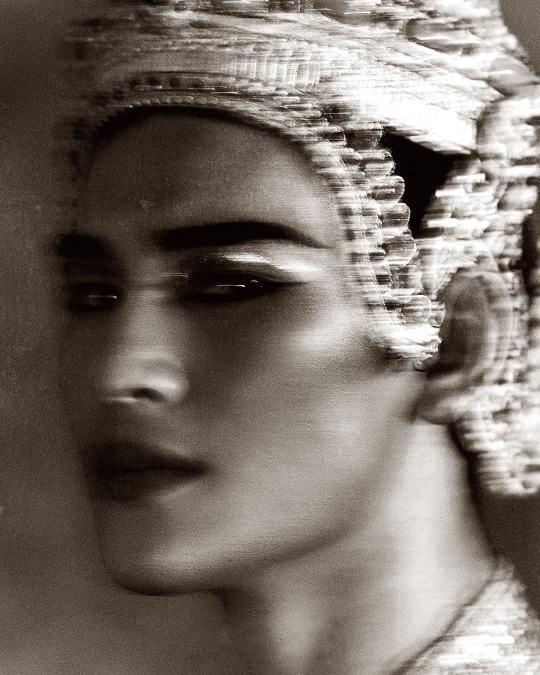
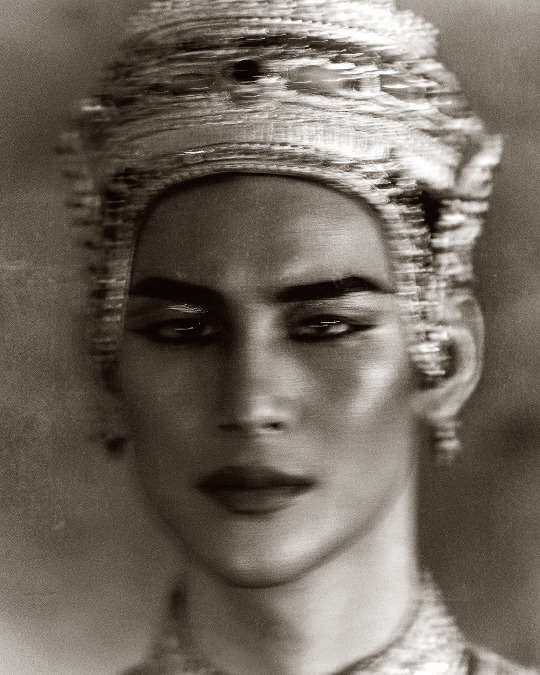
Apo Nattawin for Vogue Thailand
185 notes
·
View notes